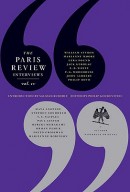Every Thursday on the blog brings a post about a paperback book.
 It seems to me that the word anthology used to have a bit more weight behind it. To anthologize something was to acknowledge it had stood the test of time, or to ensure it would keep standing it. Now, anthologies of new, loosely connected material are published every week, and the annual “Best American” series keeps expanding, threatening to simply publish all of a given year’s American writing under one rubric or other (American Blog Posts About Parking Spaces 2009, etc.)
It seems to me that the word anthology used to have a bit more weight behind it. To anthologize something was to acknowledge it had stood the test of time, or to ensure it would keep standing it. Now, anthologies of new, loosely connected material are published every week, and the annual “Best American” series keeps expanding, threatening to simply publish all of a given year’s American writing under one rubric or other (American Blog Posts About Parking Spaces 2009, etc.)
There is no better recent example of anthologizing done right than Picador’s series of Paris Review interviews, the fourth volume of which is being published this month. The books are beautifully, uniformly designed. They look great together. Even the paper they’re printed on feels terrific.
Oh, and what’s on the page is best of all.
The magazine started its interviews with prominent authors in 1953. The style of these interviews is a dying breed. If it weren’t for the fact that the Paris Review continues the tradition, it would be a dead breed. The conversations are in-depth, often recorded over a considerable amount of time, and they are crafted. In this fourth volume, Hermione Lee interviews Philip Roth. In her introduction to the piece she writes about first speaking to him in the summer of 1983. Then:
The transcripts from this taped conversation were long, absorbing, funny, disorganized, and repetitive. I edited them down to a manageable size and sent my version on to him. . . . Early in 1984, on his next visit to England, we resumed; he revised my version and we talked about the revision until it acquired its final form.
The interviews are prized, in part, for the insights they offer about the writing process. Lee coaxed this from Roth, asking him “How much of a book is in your mind before you start?”:
What matters most isn’t there at all. I don’t mean the solutions to problems, I mean the problems themselves. You’re looking, as you begin, for what’s going to resist you. You’re looking for trouble. Sometimes in the beginning uncertainty arises not because the writing is difficult, but because it isn’t difficult enough. Fluency can be a sign that nothing is happening. Fluency can actually be my signal to stop, while being in the dark from sentence to sentence is what convinces me to go on.
The insights often arrive when a subject discusses the work of other writers, as in this response from William Styron:
Faulkner doesn’t give enough help to the reader. I’m all for the complexity of Faulkner, but not for the confusion. That goes for Joyce, too. All that fabulously beautiful poetry in the last part of Finnegans Wake is pretty much lost to the world simply because not many people are ever going to put up with the chaos that precedes it. As for The Sound and the Fury, I think it succeeds in spite of itself. Faulkner often simply stays too damn intense for too long a time. It ends up being great stuff, somehow, though, and the marvel is how it could be so wonderful being pitched for so long in that one high, prolonged, delirious key.
The fourth volume will certainly appeal to poetry fans, since Marianne Moore, Ezra Pound and John Ashbery are all included. Current writers like Marilynne Robinson, Paul Auster and Haruki Murakami are also here, but it’s the golden oldies who make the series the true gem that it is. Here we get P.G. Wodehouse, E.B. White and a rollicking group interview of Jack Kerouac, which includes this representative bit of stage direction: “[Kerouac plays piano. Drinks are served.]”
For years, the culture’s idea of an interview has been five minutes spent on a couch promoting a movie. In this collection, as in the first three, another form altogether is on display. The writers are frequently witty, erudite and surprising, as when E.B. White was asked about his reading habits:
I was never a voracious reader and, in fact, have done little reading in my life. There are too many things I would rather do than read. . . . I don’t like being indoors and get out every chance I get. In order to read, one must sit down, usually indoors. I am restless and would rather sail a boat than crack a book. I’ve never had a very lively literary curiosity, and it has sometimes seemed to me that I am not really a literary fellow at all. Except that I write for a living.

